Thursday Feb 19, 2026
Thursday Feb 19, 2026
Friday, 6 November 2020 00:30 - - {{hitsCtrl.values.hits}}
By Chatura Thenuwara
According to the Asian Development Bank (ADB), the economic uncertainty caused by the pandemic is likely to cost the global economy $ 2-4.1 trillion in 2020.
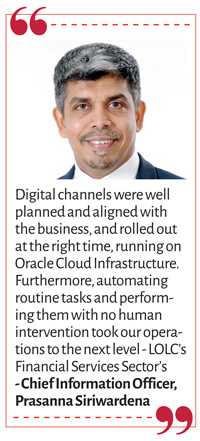 |
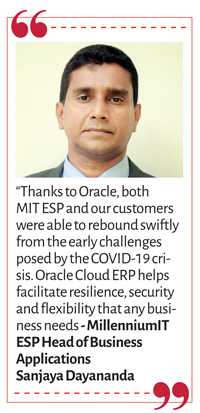 |
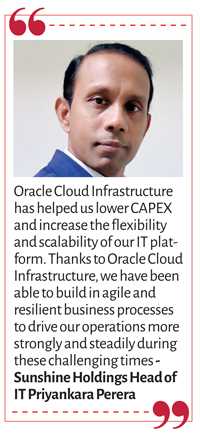 |
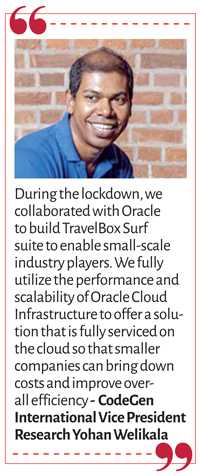 |
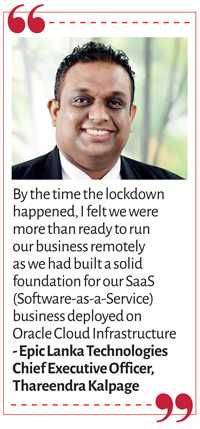 |
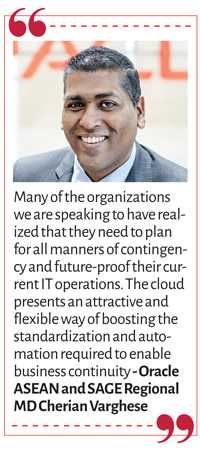 |
And while companies have adjusted, achieving new levels of agility, customer insight, connectivity and productivity, second and third waves are exposing new points of weakness, meaning resiliency is more essential to their ongoing success than ever. But it can’t come at any price.
As a new report from McKinsey suggests, enterprises need to achieve resiliency without an unsustainable increase in their costs. So how do they achieve this?
According to the report, new digital technologies being used to accelerate operational efficiency will be the vital step that companies have to take in resolving the long-standing trade-off between resilience and efficiency.
Building resilient businesses in Sri Lanka
The challenge is that even before the COVID pandemic, many companies were losing the battle to keep pace with technological change.
Now they are having to manage their transformation in the face of Government public health measures including movement restrictions and nationwide curfews. There’s also been disruption to travel, global supply chains, distribution channels, which have particularly impacted the apparel and tourism industries.
However, some resilient local enterprises have managed to rethink and as a result, are able to encourage innovation and creativity.
Talking to Daily FT, business leaders from five such leading Sri Lankan organisations share their views on how they responded to challenges posed during the initial stage of the global health crisis and how they are readying for the future as resilient businesses by leveraging cloud technology.
LOLC Holdings introduces game-changing digital initiatives
Early on in the pandemic. Sri Lanka’s premier blue-chip conglomerate LOLC faced two main business challenges, particularly around ‘collections’ and ‘execution’. In April 2020, LOLC Holdings successfully concluded the selling of its 70% stake held in Cambodia’s largest microfinance company, PRASAC, for $ 603 million (over RS. 120 billion) providing tremendous capacity and stability the Group envisages.
However, LOLC’s Financial Services Sector’s Chief Information Officer Prasanna Siriwardena shared: “Due to the lockdown, customer visits were interrupted, and customers could not visit a branch. This significantly disrupted our collections, while impacting our cash flow, which was a key business challenge.”
“Similar to collections, ‘execution” of the business was also interrupted. With all our employees working from home, we faced challenges in mapping out the roles and responsibilities of employees and how they would support the company’s short-term strategy in sustaining the business. When collections and executions stop in a financial organisation, the entire operation stops, and it will reach a standstill situation,” said Siriwardena.
Siriwardena highlighted that technology was the key to build business resilience for LOLC with remote connectivity already in place as a part of their overall IT strategy.
“LOLC was ready in terms of technology to support the business continuation. The majority of the users were equipped with remote connectivity, while others were provisioned with remote connectivity options while they were sitting at home. Furthermore, the remote connectivity solutions were planned to a granular level, where the call centre was able to operate from home to address customer queries with no interruptions.”
LOLC Technologies’ unique fintech initiative ‘iPay,’ an online payment platform, gained traction as a reliable online payment partner for both LOLC and non-LOLC customers. With almost 80% of iPay customers being non-LOLC customers, iPay became the most downloaded app on the LankaPay platform. Furthermore, the Group’s efficient and fast file approvals initiative eliminated manual file transferring between branches and the head office.
“Digital channels were well planned and aligned with the business, and rolled out at the right time, running on Oracle Cloud Infrastructure. Furthermore, automating routine tasks and performing them with no human intervention took our operations to the next level.
“We are focused on innovation and heavily investing in disruptive technologies. Our best example for that is the core banking revamping project called ‘FusionX,’ which relied on high-performance computing power, scalability, and reliability of Oracle Cloud Infrastructure. This helped us to enable these digital applications to run in the cloud smoothly as well as migrate on-prem workloads to the cloud. It enabled our stakeholders to connect with the business from anywhere in the world,” concluded Siriwardena.
MillenniumIT ESP: Supporting mission critical applications in the ‘new normal’
MillenniumIT ESP (MIT ESP), as Sri Lanka’s leading information systems solution provider delivering IT solutions to key industries in the country, is also set to evolve its service offerings, expanding its global reach and transforming enterprises in a business environment that is challenging and unpredictable.
During the COVID-19 pandemic’s first wave lockdown in Sri Lanka, MIT ESP was working around the clock to provide continual support to its customers as it maintained several critical systems for large enterprises. The company had to ensure its business continuity, safeguarding the health of their employees, whilst also ensuring the business endurance of their clientele.
Speaking to Daily FT, MillenniumIT ESP Head of Business Applications Sanjaya Dayananda said, “Constraint on employee mobility caused several obstacles in maintaining the efficient delivery of customer SLAs. These restrictions also challenged the emergency technical support and daily routine checks provided by MIT ESP, impacting the undisrupted business operations of our customers. Furthermore, reduced face time prompted the sales team to find alternative mechanisms to service clients. The delivery of committed project milestones was also affected with project management teams having to revisit targets and identify new approaches for implementing solutions remotely.”
During these testing times, Dayananda said the company aggressively used technology to mitigate the above challenges and build business resiliency.
“With infrastructure, applications, and processes being seamlessly integrated to facilitate remote working practices at MIT ESP, transitioning to tech-enabled routines such as ‘Work from Home’ during the pandemic was smooth. Our experience and knowledge also attributed in being able to support customers with setting up and adopting a similar ‘new normal’ business environment.
“Technology also drove MIT ESP to innovate and create solutions that assisted both our own business and that of our clients’. In addition, we were able to further realise the importance of cloud technologies and its core strengths, which permitted us to introduce several new cloud services internally that could ultimately be used by customers who were in similar situations. Additionally, MIT ESP was able to cater to the new technology demands in the market and record a healthy sales growth.”
MIT ESP relies on Oracle Fusion Cloud Enterprise Resource Planning (ERP) to ensure uninterrupted continuity of business. This deployment also reduced their IT complexities, increased employee productivity by automating manual processes and improved decision making through advanced data analysis.
“Thanks to Oracle, both MIT ESP and our customers were able to rebound swiftly from the early challenges posed by the COVID-19 crisis. Oracle Cloud ERP helps facilitate resilience, security and flexibility that any business needs,” said Dayananda.
Sunshine Holdings strengthens digital presence with cloud
Another company impacted by the travel restrictions limiting bricks and mortar shopping was Sunshine Holdings, a leading diversified conglomerate in the country. In particular, cashflow from its FMCG and healthcare sectors was affected, as were its sales targets, given the limitations on its Sales teams’ performance.
“Our Sales teams from both our healthcare and FMCG sectors were restricted by the lockdown. They couldn’t make their regular visits and meet customers which impacted their revenue targets and the financial performance of the company. We had to look at different ways to empower them to mitigate these challenges. Enabling a workforce of over 1,500 to work from home was a massive challenge,” Sunshine Holdings Head of IT Priyankara Perera said.
With technology as a great enabler, the company provided its employees, including Sales, with collaboration tools and other cloud-powered services. With sales automation in place, employees have been able to work remotely from anywhere in the country without disrupting their productivity. Sunshine’s digital platforms were also strengthened to enable online purchasing of essential medicines and consumer goods.
Helping the organisation roll out these technological advancements during the lockdown was Oracle Cloud Infrastructure. As Perera highlighted, the scalability and extreme performance of Oracle Cloud Infrastructure facilitated Sunshine to migrate a massive chunk of its on-premises workloads allowing employees to access the vital data its business needs without any issue.
“To support our growth plans, which includes expanding our existing business operations, modernising our applications, and digital transformation, we were one of the early adopters of cloud in the region. Today, we are realising the value of this investment. Oracle Cloud Infrastructure has helped us lower CAPEX and increase the flexibility and scalability of our IT platform. Thanks to Oracle Cloud Infrastructure, we have been able to build in agile and resilient business processes to drive our operations more strongly and steadily during these challenging times,” Perera concluded.
CodeGen repurposes technology to enable business continuity
Another industry particularly impacted by the pandemic has been the tourism industry due to the travel restrictions many countries have introduced in an attempt to contain the spread of COVID-19. In Sri Lanka, tourist arrivals fell by 50% in the first half of 2020, with zero tourists in April, May, and June.
CodeGen, a globally-recognised technology company in Sri Lanka, is the developer of TravelBox, one of the world-leading business transformation platforms used by blue-chip travel and tourism companies. Unsurprisingly, its customer base was severely affected in terms of revenue due to huge decline in travel.
CodeGen International Vice President Research Yohan Welikala shared that initially there was a lot of apprehension from the team around what everyone was going to do. The company realised that this was also an opportunity to shed some of the burdens of its legacy system quickly and gear themselves up for the uptake.
“For example, in normal circumstances, if we were cutting over from our legacy system, the transition could take six to 12 months because of the struts that needed to be built to support the existing platform. However, with the smaller number of prevailing transactions during the early days of the pandemic, we could cut this time down and it gave us a window to introduce several new features for our clients leveraging cloud technology.”
Welikala said the company’s strategy to build business resilience was two-fold. The first was to repurpose existing technology and secondly, not to build any new solutions unless there was a long-term value to it. With this in mind, CodeGen extended its face recognition software that used to track crowd behaviour to build contactless door access systems. It also expanded the use of its artificial intelligence-powered chatbot, ‘Lia,’ to the retail industry. ‘Lia’ is a text or voice chatbot that supports advanced context awareness for human-like conversations, runs Oracle Cloud Infrastructure.
“We deployed ‘Lia’ for Montenegro Airlines to provide customer service and to increase booking volumes. ‘Lia’ is capable of having human-like conversations offering rich content and a fully automated 24/7 service. This is a nice use case of how existing technology can bring more value in these challenging times,” said Welikala.
CodeGen’s collaboration with Oracle has been a very fruitful one, Welikala said. It also took advantage of using Oracle Cloud to support the creation of a lighter version of its TravelBox Enterprise version called ‘TravelBox Surf’, targeted at small-scale travel and tourism operators around the world. This process was made easier by selecting Oracle Cloud as its TravelBox suite is built on top of Oracle Database.
“During the lockdown, we collaborated with Oracle to build TravelBox Surf suite to enable small-scale industry players. We fully utilise the performance and scalability of Oracle Cloud Infrastructure to offer a solution that is fully serviced on the cloud so that smaller companies can bring down costs and improve overall efficiency,” said Welikala.
Cloud transforms Epic Lanka into a full SaaS company
Like its peers in the tech industry, Epic Lanka Technologies, one of Sri Lanka’s leading tech firms, also faced challenges, according to its Chief Executive Officer Thareendra Kalpage, particularly in the areas of supply chain and operations.
“Even before the health crisis erupted, many companies were struggling to keep pace with technological change. The challenge has only accelerated since the pandemic began, bringing the growing realisation into sharp focus: the future of work and life will be more digital than people previously imagined. With almost every organisation having to depend on data, analytics, digital tools, and automation, digital technologies will constitute an increasingly critical element of business resilience today as well as tomorrow,” said Kalpage.
However, Kalpage said that Epic Lanka Technologies was all set to operate in a challenging business environment like this. At the beginning of last year, the company started a full-scale movement to transition from a traditional software company to a fully-fledged ‘software services’ company. In this journey, Kalpage said Oracle had been an invaluable partner for Epic Lanka Technologies.
“When you move some or all your software offering from an on-premises deployment model to offering it as a service in the cloud, you change more than just how you deliver technology. You transform your entire software business. By the time the lockdown happened, I felt we were more than ready to run our business remotely as we had built a solid foundation for our SaaS (Software-as-a-Service) business deployed on Oracle Cloud Infrastructure,” Kalpage added.
Kalpage concluded by saying that at a time where consumers expecting businesses to companies to quickly respond with new business models, the massive shift to remote working will be key to long term survival of any business in the new normal and beyond.
Cloud for business resiliency
So, what can organisations take away from these shared experiences?
As economies reopen, businesses need to balance urgent and critical short-term needs with long-term strategic priorities. For companies in Sri Lanka, this means investing in efforts to help with business continuity during a period of uncertainty. The past few months have shown how organisations with low to zero digital business models have taken the biggest hit, especially in consumer-facing sectors. This has led to many businesses in Sri Lanka having to evaluate their operations and make tough decisions.
As Oracle ASEAN and SAGE Regional Managing Director Cherian Varghese shared, across the board, those organisations that have been quick to innovate and pivot based on market demands and economic landscape are finding themselves in a better place. He also said that the cloud had become the ideal solution to help both businesses and governments accelerate their efforts in enabling business resiliency.
“Many of the organisations we are speaking to have realised that they need to plan for all manners of contingency and future-proof their current IT operations. The cloud presents an attractive and flexible way of boosting the standardisation and automation required to enable business continuity,” Varghese commented.
Cloud is a journey
As a result, he shared that Oracle, overall, has witnessed an accelerated technology adoption by businesses in the SAGE (South Asian Growing Economies) region.
“Different countries have their business nuances and challenges depending upon their level of digitisation and the resulting IT landscape. Regardless, while each customer has different doors of entry into this digital transformation, they are all aiming towards one destination – to be a digitally run organisation with the solutions and services that bring the agility, as well as the performance, scale and security they need to survive today and thrive tomorrow,” concluded Varghese.
References:
1. https://www.pwc.com/lk/en/assets/COVID-19-Impact-on-Sri-Lanka-PwC.pdf
2. https://www.mckinsey.com/business-functions/operations/our-insights/jump-starting-resilient-and-reimagined-operations